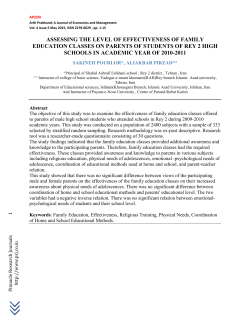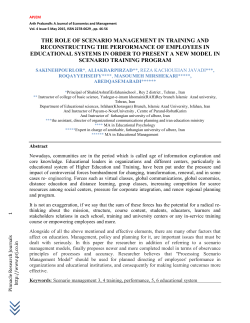
Assessing social elements influencing to social security feeling
2nd International Conference on Humanities, Geography and Economics (ICHGE'2012) Singapore April 28-29, 2012 Assessing social elements influencing to social security feeling among 16-30 year old women in Iran (case study in Tehran 2012) Maryam Yarmohammad Touski 1, Hannaneh Hajabolhasani 2, Payam Rahimizadeh 3, Noushin Jafari 4 P1F P P2F P P3F P P4F In this research the whereabouts of women’s feeling of social security in different terms of inflation increase such as: high costs of living, lodging high prices and the lack of supervisor and incredibility of those who lack supervisor in a major city like Tehran. On the other side studies are shown, women’s contribution to economic and social activism seems injustice. Abstract— The present study is descriptor and analytical and studies the feeling of social security among 16-30 year old women in Tehran and social elements influencing this feeling. In this research 384 women of 16-30 years of age have been chosen simple random and multiple phase sampling and interviewed and statistical results show that variables residence place, economic and social status and feeling of social order have positive effects and religious severance has negative reverse effect. Multi variables regression research shows that variables are influential residence feeling of security, social and economic status, the feeling of social order and religious severance have roles (in the order of prominence) on the feeling of social security by women. II. LITERATURE REVIEW 1B Social order is one of the basic notions of sociology and no society may be schematized without order. Auguste Comte the first prominent contemporary sociologist speaks of social order and the reasons of old order disintegration and new order establishment. He has done researches in statics and dynamics so that these two may be thought of as two main notions of his sociology. He believes society is a live organism in which studying every part will just be possible and done in relation to and in placement within the whole .[1] Emile Durkheim hated a feared social disorder just as did Comte believed one can decrease social disorder with social reform. Durkheim believes in primary societies in which there is mechanical solidarity and common morality, firm social order prevails and any disturbance is severely punished. But as complexities grow, collective conscience decreases, common moral system is disintegrated and disorder prevails. Durkheim believes many problems is provoked by this moral system power loss. [9] The main point in parson’s action analytical theory is the social order. He inserted the notion of norm in his social action and defined social norms on that basis. Parsons calls the fundamental phenomenon in the action theory the nit of action determined by four constituting elements: the existence of actor, the existence of an aim or status to which the actor orients itself, the situation in which action takes place (including the situation, resources, accessories) and the existence of norms and values. All of these playing their role in determining the means of achieving aim. [7] In this order Robert Morton defines social order in the level of wisdom; he believes in making relations between the social element and the social element. Morton believes if these two elements coordinate in a society (meaning if there is coordination between ends and means of getting to the ends) order prevail in the society but otherwise if there is no functional coordination between the society and the culture, there will be deviation in the society. Morton believes social Keywords—social security feeling, socio-economic status, urban violence, social order. I. INTRODUCTION S ECURITY is one of the most important needs of mankind so that its violation dissolves serenity and disturbance, anxiety and tension replace it. Urban development depends on two indices. One of them is physical density. This density is the primary human needs in city that includes are: physiological needs and physical security against natural events. The Second is moral density that include are: social security, suitable Confidence and life spiritual aspects. [10] Security is a multi faceted phenomenon and its measure could be assessed in different politic, economic and social terms. Personal data assessment has shown that seven out of every ten women have been subject to long term sexual abuse in the UK [4]). Women will not feel secure; as long as they don’t feel calm in schools, universities, workplace, public place and streets etc. According to “Domestic violence against women in Iran, women who have been victims of domestic violence do not tend to complain. The only solution to this problem is: trying to control it, strengthen and support the legal field for women who have suffered domestic violence.”[11] 1 - Maryam Yarmohammad Touski, Assistant professor in sociology- Islamic Azad university of Iran (Arak branch). ytm1340@yahoo.com 2 - Hannaneh Hajabolhasani, Master science in sociology- Islamic Azad university of Iran (Ashtian branch). hanane.abolhasani@yahoo.com 3 - Payam Rahimizadeh, Master science in sociology- Islamic Azad university of Iran (Ashtian branch). ph.rahimizadeh@gmail.com 4 - Noushin Jafari, Architecture student in master degree of Ecole National Superior d’architecture Paris Lavillete. noushin.jafari@gmail.com 1 2nd International Conference on Humanities, Geography and Economics (ICHGE'2012) Singapore April 28-29, 2012 problem derives from fundamental disturbance between social and cultural elements. So he believes insecurity in a society equals social disorder and emergence of deviation behaviors and believes this to be a consequence of a gap happening between cultural and social structural capacities to meet ends .[2] Hirschil believes dysfunctionality is due to weakness or detachment of the individual from the society .[8] Delinquency happens when individual’s attachment to the society weakens or dies and that individuals attach to each other through the following four elements: interest of dependence, commitment or adherence, involvement and believing in social and moral conventions.[6] In his book titled people, governments and terror, Barry Buzan believes since society are made up of different people with different interests and relations, so these people could be considered as sources of insecurity in their society so that every individual is following his own aims. But little by little gin insight about their commitments and sources of threat, and get ready, to keep their life and wealth, to deliver their freedom to an independent institution called government. This situation turns gradually into a mechanism through which people get to sufficient levels of security against threats f the society. In this perspective, the more powerful the political structure and government, people’s security will be provided better and with fewer expenses.[3] About reasons and genetics of the government Hobbes says the ultimate aim is demand and interest of man (who naturally love freedom and dominating others) in limiting himself .[5] According to Durkheim the religious individual binds himself to heeding to religious advices and orders on and practice to integration and solidarity with society. There is relationship between Social control of police and women's sense of social security. There is relationship between personality characteristics and women's sense of social security. 3T 3T 3T 3T 3T 3T 3T 3T 3T 3T 3T 3T 3T 3T 3T 3T 3T 3T 3T 3T 3T 3T 3T 3T 3T 3T 3T 3T 3T 3T 3T 3T 3T 3T 3T7 3T 3T 3T 3T 3T 3T 3T 3T 3T Choronbach alpha Indices 0/73 Social control feeling 0/65 Social order feeling 0/73 Location Security 0/91 Domestic violence Patriarchy 3T 0/85 Religious commitment 0/85 Social security feeling 4B - Religious commitment percentile shows that 60.9 percent were highly committed to religion and just 0.3% were little committed. - Most of the respondents (48.2 %) feel the social control in the society is average and no respondent believes the security provided by the police in the society is high. This means the police have failed to engender the feeling of security in people of the society. - 58.4% of the respondents feel little social order in the society and just 0.3% of the society feels the highest level of 3T 3T7 3T 3T 3T 3T 3T 3T7 V. FINDINGS 3T 3T 3T7 TABLE I RELIABILITY MEASUREMENT (CHRONBACH ALPHA TEST) 3T 3T 3T 0/81 3T 3T 3T 3T 3T 3T 3T 3T 3T7 3T Decline of religious commitment is associated with a reduced sense of security. There is relationship between social order and women's sense of social security. There is relationship between women's feel safe location and their sense of social security. There is relationship between women's socio-economic status and their sense of social security. 3T 3T 3T7 3T 3T 3T 2B 3T 3T 3T This research is a survey with multi phase cluster sampling and simple random sampling. In this research data were collected based on questionnaires. Statistic population includes 16-30 year old women in Tehran which were estimated using the 1385 housing and head count data (the number of women in this age range was 1303564 people) and sample size Cochran formula equal to 384 people. Sampling has been 3 areas in Tehran that including of: low, medium and high (3, 11 and 16 areas). Therefore 128 questionnaires were completed in every region. III. RESEARCH HYPOTHESIS 3T 3T 3B Family elements • Residence security • Domestic violence 3T 3T 3T IV. METHODOLOGY AND MODELS Fig. 1 Conceptual model of women’s feeling of security 3T 3T 3T Individual elements • Religious commitment • Economic and social position • Age & sex • Marital status 3T 3T 3T Social elements • Social security • Social order Feeling of security 3T 3T 3T 2 3T 3T 2nd International Conference on Humanities, Geography and Economics (ICHGE'2012) Singapore April 28-29, 2012 social order. This means many of the people under study believe there is no coordination between parts of the society. - Most of the respondents (53.3%) feel little security in the place where they live and no respondent believes there is high level of security in their residence. This means many of our neighborhoods are insecure and since residence security has a large effect on feeling of social security, lack of residence security has a negative effect on the overall feeling of security. - Most respondents (74%) are of low social and economic positions and just 0.2% had high social and economic positions. As expressed in the research the social and economic positions gives people a better feeling of security but this statistics shows to us that people who they are in low social and economic positions ,their overall feeling of security are negative effected. - 50.3% of the respondents have moderate social security feeling and just 2.55% of the people have the highest level of feeling of security. In other words they feel a partial security reigns in the society. So dramatically the number of people who feel appropriate secure is low. security. For example there is no difference between aging and youth women to afraid or security feeling. As seen in the table variables as follows according to their rank have a positive relation with the feeling of social security: residence security, social and economic position, feeling of social order, religious commitment has a meaningful relation with the feeling of social security. One of the elements that can affect women’s feeling of social security is their feeling of security where they live. In some regions women complained since police station is far from their houses or that none not exists nearby, villains find an opportunity to disturb the peace of the neighborhood. For the serenity of the people especially young women and girls, it is thus suggested that the police take appropriate measures to both increase the number of the police stations in the city, and also make streets more secure with their presence at the time when schools finish work every day. As seen in the analytical results and deductive statistics the feeling of social security had no meaningful relation with the feeling of social security. This means feeling of social control cannot bring about the feeling of social security in women; it even decreases their feeling of social security. VI. SUMMARY AND CONCLUSION First Hypothesis: There is relationship between Social control of police and women's sense of social security. This was rejected with 95% certainly level, 0.001 correlation coefficient and 0.491 meaningfulness level. There is no meaningful relation between the feeling of social control and the feeling of social security. Second Hypothesis: There is relationship between social order and women's sense of social security .This was confirmed with 99% certainly level, 0.130 correlation coefficient and 0.017 meaningfulness level. There is a meaningful relation between the feeling of social order and the feeling of social security. Third Hypothesis: There is relationship between women's feel safe location and their sense of social security. This was confirmed with 99% certainly level, 0.536 correlation coefficient and 0.000 meaningfulness level. There is a meaningful relation between the feeling of residence security and the feeling of social security. Fourth Hypothesis: There is relationship between women's socio-economic status and their sense of social security. This was confirmed with 99% certainly level, 0.114 correlation coefficient and 0.020 meaningfulness level. There is a meaningful relation between the feeling of social and economic position and the feeling of social security. Fifth Hypothesis: Decline of religious commitment is associated with a reduced sense of security. This was confirmed with 99% certainly level, -0.189 correlation coefficient and 0.000 meaningfulness level. This holds there is a meaningful relation between the feeling of religious commitment and the feeling of social security. Sixth Hypothesis: There is no relationship between personality characteristics and women's sense of social TABLE II MULTI VARIABLE REGRESSION TO IDENTIFY ELEMENTS AFFECTING SOCIAL SECURITY # Variable B X1 The feeling of residence security Economic and social status Feeling of social order Religious commitment Constant X2 X3 X4 Y Beta T Sig 1.330 Standard deviation 0.134 0.539 9.949 0.00 0 0.275 0.110 0.135 2.508 0.01 3 1.151 0.482 0.129 2.386 -0.077 0.035 -0.119 -2.207 17.175 3.035 0.01 8 0.02 8 0.00 0 5.658 The presence of social control agents in the city not only does not increase women’s feeling of social security but also drastically decreases it. The police force agents’ performance needs to be rethought so that people feel them as one of their own and so trust them. The more women’s life place gets secure, and people’s performance is better and broader, women will feel more secure REFERENCES [1] Aron, Raymon (2003) “fundamental steps of the current of thought in sociology”, translated by Bagher Parham, Tehran: Elmi va Farhangi publication, 6th edition; 115-116 [2] Boudon, Raymon and Burico Francaois (2006) crtical culture of sociology, translated by Abdolhossein Nikgohar, Tehran, farhnag Moaser publication, first edition, H.;661 3 2nd International Conference on Humanities, Geography and Economics (ICHGE'2012) Singapore April 28-29, 2012 [3] Buzane, Barry (1999) people, governments and terror, translated by approach studies scientific institute, Tehran, approach studies scientific institute publication, first edition;86-87 [4 ]Giddens, Anthony (2006) sociology, translated by Hasan Chavoshian, Tehran, Ney publication; 219 [5] Hobbes, Thomas (1998) Leviathan translated by Hosein Bahirieh, Tehran, Nay publication, fifth edition;189 [6] Mohseni Tabrizi ,Alireza (2004) Vandalism, Tehran university publication;138 [7] Ritzer, George (2004) sociological theories in the current era. Tehran scientific publication; 190 [8] Sotudeh ,Hedayatollah (2007) social pathogenic, Tehran, Avaye Noor publican, tenth edition;138 [9] Versely, Peter (1999) social order in sociological theories”, translated by Said Moidfar, Tehran, Tebyan cultural and publication institute, first edition;23 [10] Yarmohammad Touski,Maryam(2012),”Urban development and social solidarity”, Culture and social solidarity in Urban development conference ,Arak. [11] Yarmohammad Touski,Maryam(2011),”Domestic violence against women in Iran”, ISEM-Planetary Scientific Research Centre Conferences 2011. Bangkok, Thailand. 4
© Copyright 2025










